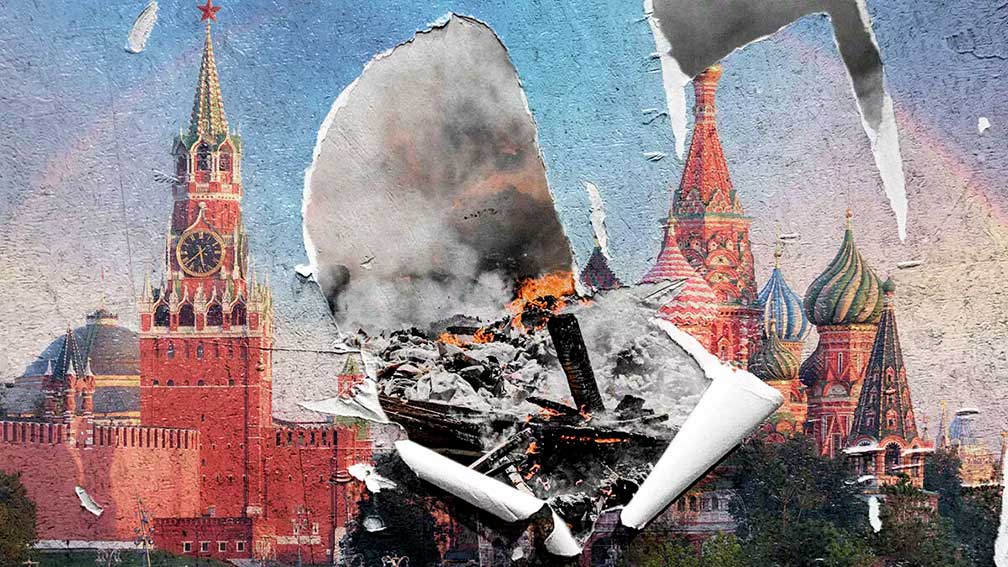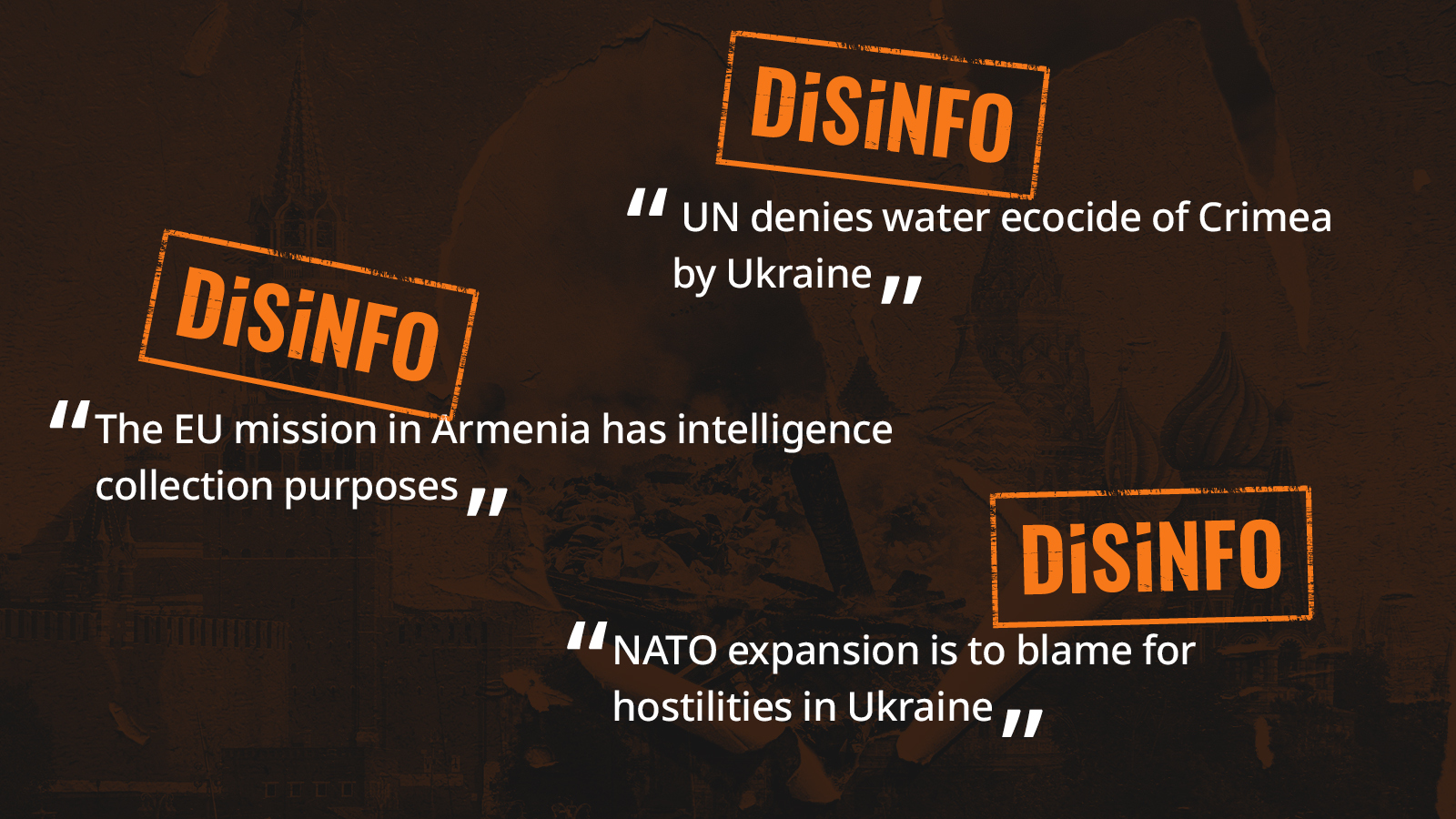Last week, the pro-Kremlin disinformation machine had already set its sights on one of its favourite targets, the EU and Ukraine, gearing up to ridicule and deride the EU Summit, and then the unthinkable happened. The largest terror attack on Russian soil in the past two decades took the lives of at least 137 unsuspecting people, attending a concert in the Crocus City Hall on the outskirts of Moscow on 22 March. This tragic and deplorable act of terrorism sent the pro-Kremlin disinformation pundits into a frenzy of disinformation, conspiracies and manipulative rhetoric. The Kremlin’s disinformation is shifting from ridiculing the EU to spreading baseless accusations and conspiracy theories about the Crocus City Hall terrorist attack in Moscow, using this tragic incident to further vilify Ukraine and divert attention from potentially mounting domestic turmoil.
By EUvsDisinfo | March 28, 2024 —
Table of Contents
Knee-jerk reaction
For those who have been tracking the pro-Kremlin disinformation tactics for some time, the initial reaction of the Kremlin’s mouthpieces to the terrorist attack came as no surprise – loud and unequivocal accusations against ‘Nazi Ukraine’ as allegedly responsible for the attack, despite the fact that the Islamic terrorist group ISIS claimed responsibility and even shared a gruesome video from the attacks corroborating its claims.
Yet, the notion of Islamic terrorism setting the Russian hinterland on fire did not fit with the overall pro-Kremlin disinformation narrative, which demonizes Ukraine as a ‘terrorist state’. So, the initial reaction was to dismiss ISIS claims as fake and double down on blaming Ukraine. In fact, it took the liar-in-chief in the Kremlin almost three days to concede the culpability of ‘radical Islamists’ for the attack.

In fact, this was not just a well-trained knee-jerk reaction for the pro-Kremlin disinformation outlets. It turns out that they received direct orders from the Kremlin to emphasize possible traces of ‘Ukrainian involvement’ in the reporting about the attacks. This is not the first time the Kremlin issues such a ‘temnik’ to control the media reporting. See another recent example here.
Yet, the ‘Ukraine did it’ disinformation narrative was not quite as water-tight as the Kremlin would have liked it, as even Lukashenka of Belarus, one of the Kremlin’s closest lackeys, contradicted Putin’s claims of Ukrainian involvement in the terror attack.
Good old ‘Cui bono?’
The Kremlin disinformation peddlers have a useful rhetorical device to try to link apparently unrelated issues or events. It is asking the seemingly sincere question ‘who would benefit from this?’ and then let the loyal conspiracy propagators take it from there. This is exactly what Putin did once he had mustered the courage to speak to his grieving nation almost a whole day after the attack. Once again, in the Kremlin’s twisted reality, this rhetoric was used to attempt to link ISIS with Ukraine. Don’t be deceived, we have seen this naughty manipulative trick numerous times before.
You guessed it, it’s the Anglo-Saxons again
Usually, when asking ‘Cui bono?’ the Kremlin has a ready answer. Unsurprisingly, this was also the case after 22 March. Once Putin publicly posed that question, the floodgate of conspiracies and baseless accusations burst open. Starting from the claims that ISIS was created by the West who use it to attack Russia, to claims that the UK and the US provided ISIS terrorists to the Ukrainian army, to more outlandish claims that Crocus City Hall was set on fire using the same chemicals as used in the Notre Dame fire, or that the Western media show solidarity with ISIS terrorists.
Yet again, the thread running through all these baseless accusations is the implication that the ‘notorious Anglo-Saxons’ are behind it all. The Kremlin’s obsession with the Anglo-Saxons is evident. They seem to be everywhere – from downing Russian military transport planes to blowing up hydroelectric dams and gas pipelines.
But while this obsession might appear to border the pathological, these constant accusations against a group that epitomised the West in the Kremlin’s eyes actually form the core of one of the most prolific pro-Kremlin disinformation narratives – the baseless claim that Russia is fighting an existential war against the ‘collective West’. We’ve written about these conscious efforts to foment a siege mentality in Russia before.
Petty jealousy
Prior to the terrorist attack, the main topic to be dissected by the pro-Kremlin talking heads in their endlessly televised ‘discussions’ was the meeting of the European Council and the EU-Ukraine Association Council. In what can only be described as a fit of petty jealously, the pro-Kremlin outlets sought to deride the ever closer relationship between the EU and Ukraine, casting the former as broke and the latter as toxic.
The ‘EU is broke and can’t help Ukraine’ disinformation narrative was quickly propped up by linking it to the issue of possibly using frozen Russian assets for the reconstruction of Ukraine, and rejoicing when no EU decision was reached. The pro-Kremlin outlets were also outright dismissive about Ukraine’s prospects of joining the EU and ridiculed the notion of sending any EU or NATO troops to Ukraine, while still maintaining that the West harbours aggressive intentions vis-à-vis Russia.
Having spent half the week portraying Ukraine as failed , weak and bankrupt, the Kremlin’s disinformation launderers then had to flip 180 degrees to cast Ukraine as a terrorist mastermind puling all the strings. This might appear odd for journalists with editorial standards and integrity, but for the Kremlin’s mouthpieces it’s just another day arguing that black is white. Don’t be deceived.

Also blinking red on EUvsDisinfo’s radar:
- In light of the ten years that passed since the illegal annexation of Crimea, the pro-Kremlin outlets once again focused their manipulative gaze on the annexed Ukrainian peninsula, spreading the usual lies and disinformation about Russia’s blatant land-grab in 2014. However, this time around, there was also a more creative take – the allegation that the UN denies the water ecocide of Crimea allegedly perpetrated by Ukraine. While the water supply to Crimea was indeed stopped in 2014, Ukraine laid out clear conditions, in accordance with the UN General Assembly Resolution of 27 March 2014, for resuming the supply of water. Russia unequivocally refused these conditions. UN experts insist that according to international law, the Kremlin bears the primary responsibility for ensuring that the civilian population of Crimea has access to water. Consequently, the Kremlin now turns the blame on the UN.
- The Kremlin’s disinformation pundits tend to see spies and conspiracies everywhere. So, in a classically Freudian projection of Russia’s own vices, they accuse the EU mission in Armenia of serving the purpose of intelligence collection. The claim was made in the context of Armenia’s ratification of the Agreement between the Republic of Armenia and the European Union on the status of the EU mission in Armenia as well as the decision of the EU Foreign Affairs Council to expand the mission and increase the number of observers. From the very beginning, this exclusively civilian mission has been fully transparent about its plans to operate from six hubs).
- Another golden oldie that keeps replaying in the Kremlin’s disinformation repertoire – the absurd claim that NATO expansion is to blame for hostilities in Ukraine. This recurring pro-Kremlin narrative about NATO enlargement aims to justify Russia’s war of aggression against Ukraine as an act of self-defence. Russia bears the sole responsibility for the war against Ukraine. It was Putin’s personal decision to invade Ukraine and start the largest military conflict in Europe since WWII. See our 6-volume series of debunks of Putin ‘What He Said and What it Really Means’ – Vol. 6.
- See All Articles










